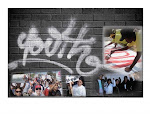[1]Dr. Carolyn
Fortuna
fortunac@franklin.k12.ma.ua
508. 541. 3200, extension 3013
Syllabus for Senior Honors English, 2009-2010
Franklin High School (MA)
http://www.drcarolynsblog.blogspot.com/
http://www.societyissuesidentity.blogspot.com/
www.franklin.ma.us/auto/schools/fhs/depts/english/Fortuna/default.htm
“… (E)ducating students to be critical rather than merely good citizens must recognize the multiple narratives and histories that make pluralistic societies”
(Freire & Giroux, 1989).
Course overview
English 12 Honors will respect grammar (examination of the component parts of language --- semantics, pragmatics, and syntax), rhetoric (the art of persuasion through language), and dialectics (questioning and argumentation as a means to interrogate the structures of the society in which we live). Our goals are to become more fully literate and to deepen our understanding of ways that society and culture contribute to identity formation and worldviews. The cultural aspect of literacy asks readers to consider texts in relation to context and to recognize the socially constructed components in all human acts and practices. Called critical literacy, this education will draw from Freire’s model of critical pedagogy and encourage you to ask questions and dialogue with Ms. Fortuna about what you watch, see, and read. Freire (1992) refers to “critical and liberating dialogue, which presupposes action” (p. 52) as essential to engaged learning, because you respond in authentic ways when engaged in inquiry. Evaluation of sources comprises a significant role in critical literacy education, so you will examine structures and framing of messages.
Course philosophy
Language choices have tremendous power to shape a reader’s conceptualization of reading. Texts in this course will include all forms of symbolic expression that create meaning for readers. As a result, texts will transcend print and include visual, digital, and audio sources. This definition of literacy is sometimes referred to as multimodality (Bourdieu, 1977; Kress & van Leeuwen, 2001).
Student rights, responsibilities, policies, and procedures
Please note that all FHS Student Handbook rights, responsibilities, policies, and procedures apply to Ms. Fortuna’s senior honor English classes.
Curriculum policies
Unless otherwise stated, all assignments are due at the beginning of class. You should have the assignment printed prior to class and ready to turn in. If you’re late to class, so is your paper. Students should always write in pen for in-class assessments. All English class students at FHS will be held accountable for originality through the computer program, Turn It In.
Course description: In this course, you will:
Ø Grow as literate learners by naming and defining key constructs of literacy, including communication models, communication technologies, literacy terminology, message design, and symbol systems;
Ø Compare and contrast different theoretical frameworks;
Ø Define structural features and intents of multimodal texts.
Ø Reconceptualize learning as a long-term, thinking-centered process
· Speak, listen, interpret, read, and write as significant means in which to reflect on our own thinking processes
· Develop structures for discussing, analyzing, and composing texts
· Compose and deliver several presentations to the class of varying lengths
· Survey online research databases
· To help you think more clearly and effectively by:
* Organizing your ideas in a well-structured, succinct, and creative manner
* Designing argument statements
* Realizing that what you write is an extension of you and your ideas
* Understanding that good writing comes from rewriting
* Improving your writing and thinking and rethinking
Course texts and core assignments
Senior honors English requires that you read and analyze text 30 to 45 minutes every school night. The following texts are required in the curriculum:
Chaim Potek’s The Chosen, Herman Melville’s Billy Budd, Henrik Ibsen’s Ghosts and A Doll’s House, Joseph Conrad’s Heart of Darkness and The Secret Sharer, Edward Albee’s American Dream and The Zoo Story, William Shakespeare’s Othello, Zora Neale Hurston’s Their Eyes Were Watching God, Thornton Wilder’s Our Town, and Emily Bronte’s Wuthering Heights.
Seniors will study vocabulary, parts of speech, and SAT prep through Vocabulary Workshop G. Seniors must subscribe to “The Official SAT Question of the Day” at the website called, http://www.collegeboard.com/student/testing/sat/prep_one/prep_one.html
Seniors will study grammar through Elements of Language.
The senior honors English curriculum contains several core writing assignments. Among them are:
· A style and language analysis, based on Othello by Shakespeare
· A characterization as a reflection of culture analysis, based on Zora Neale Hurston’s Their Eyes Were Watching God
· A critique of contemporary society after reading Ibsen and Albee
· A 10-page paper, comprised of discussion of two independent reading texts, one curriculum text, and a literature review with ten (minimum) peer-reviewed scholarly research sources
A composer’s digital portfolio
You will keep throughout the year a record of your progress as a writer, thinker, analyst, learner, visualizer, and composer. Aside from full-length curriculum assignments, your digital portfolio is an open field. Here are a few samples of how your thinking might be captured in digital form.
Conferences
You will have abundant opportunities for in-class help with individual conferences. In addition, while we’re working in the library or in one of the computer labs, you and Ms. Fortuna will conference. Ms. Fortuna can also schedule occasional conferences before or after school [by appointment only]. Conferences are intended to individualize your learning experience, to give your personal time to brainstorm ideas with an adult, and to give you practical help. It is highly encouraged that you plan for and take advantage of these conferences.
Grading
Grading is typically as follows:
One day assignments: 5 points
Extended day/ process assignments: 10 points
Quizzes: 20- 25 points
Projects: 50 - 100 points (depending on complexity)
Presentations to the class: 20- 100 points (depending on time requirements)
Research paper: 250 points
[1] Ph.D. in Education: dissertation defense autumn 2009
01 September 2009
Subscribe to:
Post Comments (Atom)



No comments:
Post a Comment